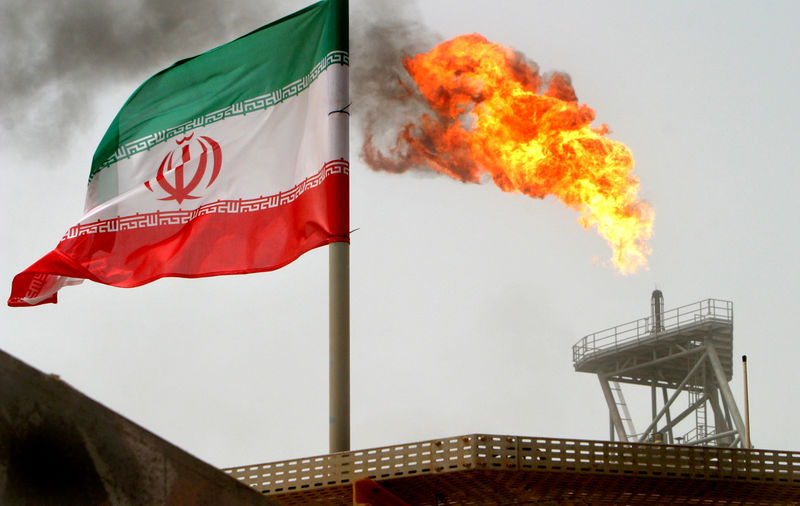By Henning Gloystein
SINGAPORE (Reuters) - Asian buyers of Iranian crude are well placed to overcome the end of U.S. sanctions waivers as they have demonstrated they can live without it and as global producers have the capacity to make up a shortfall, according to analysts and trade data.
The United States on Monday demanded buyers of Iranian oil stop purchases by May or face sanctions, ending six months of waivers which allowed Iran's eight biggest buyers, most of them in Asia, to continue importing limited volumes.
The announcement came amid an already tight market as the Organization of the Petroleum Exporting Countries (OPEC) and other major producers, including Russia, have been curtailing supply since January to prop up prices.
Global benchmark Brent crude futures rose to as high as $74.69 a barrel on Tuesday, the most this year. The surging crude will mean higher fuel costs for Asian economies. Iran's four-biggest crude buyers are China, India, Japan and South Korea.
Despite the cost surge, supply shortfalls are unlikely.
The end of the waivers should cut Iranian exports by 900,000 barrels per day (bpd), Goldman Sachs (NYSE:GS) said late on Monday. That is more than made up by "immediately available" spare capacity from producers including Saudi Arabia, the United Arab Emirates (UAE) and Russia of about 2 million bpd, which could rise to 2.5 million bpd next year.
In a statement on the end of the waivers, U.S. President Donald Trump said the United States, Saudi Arabia, and the UAE would ensure oil markets are fully supplied.
"The United States have more than proved that they are able to fill any voids left by sanctions," said Matt Stanley, a broker with Starfuels in Dubai.
Even if U.S. output should fall short, Stanley said, "Saudi and the United Arab Emirates are going to ensure they will increase production to offset any loss in supply from Iran."
Iran's four main Asian buyers ramped up imports in March and April in anticipation of the end of the waivers. But before that, all the countries already showed they could dial down their purchases.
Before the sanctions, Iran was OPEC's fourth-largest producer at almost 3 million bpd, but April 2019 exports have shrunk to around 1 million bpd, according to ship tracking and analyst data in Refinitiv.
GRAPHIC: Iran seaborne crude oil & condensate exports - https://tmsnrt.rs/2DE8CHt
THE BIG TWO
Iran's biggest oil buyers are China and India.
China on Monday criticized the U.S. decision, but trade data shows it can cope with lower Iranian imports.
Ship tracking data in Refinitiv showed China's crude imports from Iran averaging 500,000 bpd since the start of 2019, down from a 2018 peak of 800,000 bpd, and only 5 percent of its overall crude imports.
Dai Jiaquan, head of the Research Institute of China National Petroleum Corporation (CNPC), said on Tuesday that other suppliers could fill the gaps, particularly U.S. crude.
He noted that estimated U.S. crude output increases this year are between 1.6 million and 1.7 million bpd, that alone would outpace expected global oil demand growth of 1.2 million to 1.3 million bpd.
Adding spare capacity from OPEC means "there will not be short supply in the market," said Dai.
The United States is now the world's biggest oil producer, pumping more than 12 million bpd with exports topping 3 million bpd
India has also reduced Iranian purchases, averaging 300,000 bpd this year, around 6 percent of overall imports, down from a peak of 750,000 bpd in mid-2018, Refinitiv data showed.
India's Oil Minister Dharmendra Pradhan said on Tuesday his country could access supplies from other producers to compensate for Iranian losses.
"Indian refineries are fully prepared to meet the national demand for petrol, diesel and other petroleum products," he said.
GRAPHIC: U.S. crude oil production & exports - https://tmsnrt.rs/2ULQiTd
THE ALLIES
Close U.S. ally Japan halted all Iranian crude imports between November 2018 and January 2019, Refinitiv data showed, and imports since then have averaged below 200,000 bpd, equivalent to 5 percent of demand.
The tighter U.S. sanctions should have only a limited impact on Japan, Hiroshige Seko, the trade and industry minister, said on Tuesday.
South Korea also cut all of its Iranian oil imports between August and December 2018. This year, Korea has averaged around 300,000 bpd of imports, mostly of condensate, an ultra-light oil used by many of its refiners to make petrochemicals.

GRAPHIC: Iran crude oil & condensate exports to Asia's biggest buyers - https://tmsnrt.rs/2IAUWky